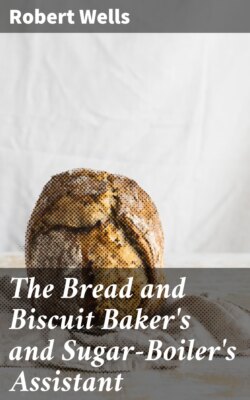Читать книгу The Bread and Biscuit Baker's and Sugar-Boiler's Assistant - Robert Wells - Страница 6
На сайте Литреса книга снята с продажи.
Chemistry as applied to Bread-Making.
ОглавлениеTable of Contents
It is not my intention to depreciate the great good that would be derived from scientific chemistry if properly applied to bread-making. But who is to study and apply it? Surely not a man who earns from 20s. to 30s. per week, and works twelve, fourteen, and sixteen hours a day in an overheated atmosphere. What hours of rest he has should be used to recuperate his lost vitality. Not till scientific chemistry is taught in our Board schools and made one of the elements of a scholar’s ordinary education, can we hope to see it used successfully with bakers in making bread.
Chemistry, I believe, is destined to play as important a part in the annals of the baking trade as did the substitution of machinery for hand labour. But at the present day how many bakers know that the decomposition of sugar produces fermentation; that fermentation destroys sugar and produces alcohol; that maltose assists fermentation; that starch, however obtained, has always the same characteristics, though there are different kinds from different sources; that dextrine is soluble in water and insoluble in alcohol; that protoplasm, the basis of all life, consists of protein, compounds, mineral salts, nitrogen, &c.? And do not the meaning and use of terms familiar in scientific chemistry—such as diastase, cerealin, gluten, and others—only perplex the ordinary journeyman baker, and make him think that the less he has to do with science, the more easily he will get his life “rubbed through.” It is impossible for working bakers to become acquainted with these things while in the bakehouse; and while there are in many towns such valuable institutions as free libraries, mechanics’ institutes, &c., they are not available to the ordinary baker, as his hours are so exceptional. The baker’s hours of labour, indeed, are shorter in many places than they used to be, and he is no longer called “the white slave.” Still, the spirit of competition is so strong that a baker has to work much harder proportionally than other working men, and his mind is in no condition, in the little spare time he has, to study the problems of science; and nobody can expect the baker to know, as it were by intuition, the whys and the wherefores of chemistry. However, what he has learnt in the practice of his art, and what the common custom of the trade has handed down to him, he may use to more or less advantage, according as he has more or less personal skill. In the case of fermentation, which may be described as the very backbone of bread-making, a baker will find plenty to study and to think about, from his first “setting the sponge” until his bread is out of the oven, without perplexing himself over problems about which he can understand little or nothing.
With time and money at his disposal, however, the study of chemistry opens up a wide field to the studious baker, and would no doubt reward him for his pains, and at the same time prove a great gain to his trade; and I believe there are not a few earnest workers labouring at the present time to afford that knowledge and help to the journeyman baker which will eventually lead to an easier way of earning his daily bread.
